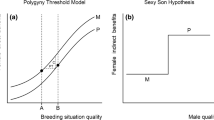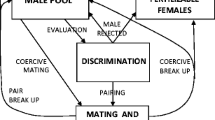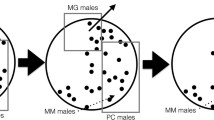Abstract
The question of why males invest more into competition than offspring care is an age-old problem in evolutionary biology. On the one hand, paternal care could increase the fraction of offspring surviving to maturity. On the other hand, competition could increase the likelihood of more paternities and thus the relative number of offspring produced. While drivers of these behaviours are often intertwined with a wide range of other constraints, here we present a simple dynamic model to investigate the benefits of these two alternative fitness-enhancing pathways. Using this framework, we evaluate the sensitivity of equilibrium dynamics to changes in payoffs for male allocation to mating versus parenting. Even with strong effects of care on offspring survivorship, small competitive benefits can outweigh benefits from care. We consider an application of the model that includes men’s competition for hunting reputations where big game supplies a benefit to all and find a frequency-dependent parameter region within which, depending on initial population proportions, either strategy may outperform the other. Results demonstrate that allocation to competition gives males greater fitness than offspring care for a range of circumstances that are dependent on life-history parameters and, for the large-game hunting application, frequency dependent. The greater the collective benefit, the more individuals can be selected to supply it.





Similar content being viewed by others
References
Andersson BM (1994) Sexual selection. Princeton University Press, Princeton
Balshine S (2012) Patterns of parental care in vertebrates. In: Royle NJ, Smiseth PT, Kölliker M (eds) The evolution of parental care, chapter 4, 1st edn. Oxford University Press, Oxford, pp 62–80
Bateman AJ (1948) Intra-sexual selection in drosophila. Heredity 2(Pt. 3):349–368
Berbesque JC, Marlowe FW (2009) Sex differences in food preferences of Hadza hunter–gatherers. Evol Psychol 7(4):147470490900700409
Bird R (1999) Cooperation and conflict: the behavioral ecology of the sexual division of labor. Evol Anthropol Issues News Rev 8(2):65–75
Blurton Jones NG (2016) Demography and evolutionary ecology of Hadza hunter–gatherers. Cambridge University Press, Cambridge
Clutton-Brock T (1991) The evolution of parental care. Princeton University Press, Princeton
Clutton-Brock TH, ParkerParker GA (1992) Potential reproductive rates and the operation of sexual selection. Q Rev Biol 67(4):437–456
Cockburn A (2006) Prevalence of different modes of parental care in birds. Proc R Soc Lond B Biol Sci 273(1592):1375–1383. https://doi.org/10.1098/rspb.2005.3458
Coxworth JE, Kim PS, McQueen JS, Hawkes K (2015) Grandmothering life histories and human pair bonding. Proc Nat Acad Sci 112(38):11806–11811. https://doi.org/10.1073/pnas.1599993112
Darwin C (1859) On the origin of species by means of natural selection, or preservation of favoured races in the struggle for life. John Murray, London
Darwin C (1874) The descent of man, and selection in relation to sex. John Murray, London
Dewsbury DA (2005) The Darwin-Bateman paradigm in historical context. Integr Comp Biol 45(5):831–837
Fisher DA (1930) The genetical theory of natural selection. Clarendon Press, Oxford
Fromhage L, Michael DJ (2016) Coevolution of parental investment and sexually selected traits drives sex-role divergence. Nat Commun 7:12517
Grafen A (1990a) Sexual selection unhandicapped by the Fisher process. J Theor Biol 144(4):473–516
Grafen A (1990b) Biological signals as handicaps. J Theor Biol 144(4):517–546
Gurven G, Kaplan H (2007) Longevity among hunter–gatherers: a cross-cultural examination. Popul Dev Rev 33(2):321–365
Hardin G (1998) Extensions of “the tragedy of the commons”. Science 280(5364):682–683
Hawkes K (1991) Showing off: tests of an hypothesis about men’s foraging goals. Ethol Sociobiol 12(1):29–54
Hawkes K (1993) Why hunter–gatherers work: an ancient version of the problem of public goods. Curr Anthropol 34(4):341–361
Hawkes K, Bird BB, Kristen Hawkes and Rebecca Bliege Bird (2002) Showing off, handicap signaling, and the evolution of men’s work. Evol Anthropol Issues News Rev 11(2):58–67
Hawkes K, O’Connell JF, Blurton Jones NJ (1991) Hunting income patterns among the Hadza: big game, common goods, foraging goals and the evolution of the human diet. Philos Trans R Soc B Biol Sci 334(1270):243–251
Hawkes K, O’Connell JF, Blurton Jones NG (1997) Hadza women’s time allocation, offspring provisioning, and the evolution of long postmenopausal life spans. Curr Anthropol 38(4):551–577
Hawkes K, O’Connell JF, Blurton Jones NG (2001a) Hadza meat sharing. Evol Hum Behav 22(2):113–142
Hawkes K, O’Connell JF, Blurton Jones NG, Bell D, Bird R, Bird D, Hames R, Ivey P, Judge D, Kazankov A et al (2001b) Hunting and nuclear families: some lessons from the hadza about mens work. Curr Anthropol 42(5):681–709
Hawkes K, O’Connell JF, Jones NGB (2014) More lessons from the Hadza about men’s work. Hum Nat 25(4):596–619
Henshaw JM, Fromhage L, Jones AG (2019) Sex roles and the evolution of parental care specialization. Proc R Soc B 286(1909):20191312
Hill K, Kaplan H, Hawkes K, Hurtado AM (1985) Men’s time allocation to subsistence work among the ache of eastern Paraguay. Hum Ecol 13(1):29–47
Hill K, Kaplan H, Hurtado AM (1987) Foraging decisions among ache hunter–gatherers: new data and implications for optimal foraging models. Ethol Sociobiol 8(1):1–36
Hill K, Hurtado AM (1996) Ache life history: the ecology and demography of a foraging people. Aldine de Gruyter, New York
Houston AI, Szèkely T, McNamara JM (2005) Conflict between parents over care. Trends Ecol Evol 20(1):33–38
Hurtado AM, Hill K, Hurtado I, Kaplan H (1992) Trade-offs between female food acquisition and child care among hiwi and ache foragers. Hum Nat 3(3):185–216
Hurtado AM, Hawkes K, Hill K, Kaplan H (1985) Female subsistence strategies among ache hunter–gatherers of eastern Paraguay. Hum Ecol 13(1):1–28
Isaac G (1978) The food-sharing behavior of protohuman hominids. Sci Am 238(4):90–109
Janicke T, Häderer IK, Lajeunesse MJ, Anthes N (2016) Darwinian sex roles confirmed across the animal kingdom. Sci Adv 2(2):e1500983
Jennions MD, Fromhage L (2017) Not all sex ratios are equal: the Fisher condition, parental care and sexual selection. Philos Trans R Soc B Biol Sci 372(1729):20160312
Kim PS, Coxworth JE, Hawkes K (2012) Increased longevity evolves from grandmothering. Proc R Soc Lond B Biol Sci 279(1749):4880–4884
Kim PS, McQueen JS, Coxworth JE, Hawkes K (2014) Grandmothering drives the evolution of longevity in a probabilistic model. J Theor Biol 353:84–94
Hope K, Suzanne HA, Michael BB (2012) Theoretical foundations of parental care. In: Nick JR, Smiseth TP, Mathias K (eds) The evolution of parental care, chapter 2, 1st edn. Oxford University Press, Oxford, pp 21–36
Knott DC (2001) Female reproductive ecology of the apes: implications for human evolution. In: Ellison P (ed) Reproductive ecology and human evolution. Aldine, New York, NY, pp 429–463
Kokko H, Jennions MD (2008) Parental investment, sexual selection and sex ratios. J Evol Biol 21(4):919–948
Kokko H, Jennions MD (2012) Sex differences in parental care. In: Kölliker M (ed) The evolution of parental care, chapter 6. Oxford University Press, Oxford, pp 101–116
Lancaster JB, Lancaster CS (1983) Parental investment: the hominid adaptation. In: Ortner DJ (ed) How humans adapt: a biocultural odyssey. Smithsonian Institution Press, Washington, pp 33–56
Lehtonen J, Parker GA (2014) Gamete competition, gamete limitation, and the evolution of the two sexes. Mol Hum Reprod 20(12):1161–1168
Lehtonen J, Parker GA, Schärer L (2016) Why anisogamy drives ancestral sex roles. Evolution 70(5):1129–1135
Loo SL, Chan MH, Hawkes K, Kim PS (2017a) Further mathematical modelling of mating sex ratios & male strategies with special relevance to human life history. Bull Math Biol 79(8):1907–1922
Loo SL, Hawkes K, Kim PS (2017b) Evolution of male strategies with sex-ratio-dependent pay-offs: connecting pair bonds with grandmothering. Philos Trans R Soc B Biol Sci 372(1729):20170041
Marlowe FW (2007) Hunting and gathering: the human sexual division of foraging labor. Cross Cult Res 41(2):170–195
Mcnamara JM, Székely T, Webb JN, Houston AI (2000) A dynamic game-theoretic model of parental care. J Theor Biol 205(4):605–623
Parker GA (2014) The sexual cascade and the rise of pre-ejaculatory (Darwinian) sexual selection, sex roles, and sexual conflict. In: Cold Spring Harbor Perspectives in Biology, p a017509
Parker GA, Lehtonen J (2014) Gamete evolution and sperm numbers: sperm competition versus sperm limitation. Proc R Soc Lond B Biol Sci 281(1791):20140836
Parker GA, Pizzari T (2015) Sexual selection: the logical imperative. In: Hoquet T (ed) Current perspectives on sexual selection: what’s left after Darwin? Chapter 7, 1st edn. Springer, New York
Parker GA, Baker RR, Smith VGF (1972) The origin and evolution of gamete dimorphism and the male-female phenomenon. J Theor Biol 36(3):529–553
Parker GA, Royle NJ, Hartley IR (2002) Intrafamilial conflict and parental investment: a synthesis. Philos Trans R Soc B Biol Sci 357(1419):295–307
Queller DC (1997) Why do females care more than males? Proc R Soc Lond B Biol Sci 264(1388):1555–1557
Robbins AM, Robbins MM, Gerald-Steklis N, Steklis HD (2006) Age-related patterns of reproductive success among female mountain gorillas. Am J Phys Anthropol 131(4):511–521
Robson SL, Van Schaik CP, Hawkes K (2006) The derived features of human life history. In: Hawkes K, Paine R (eds) The evolution of human life history. School for Advanced Research Press, Sante Fe, pp 17–44
Rose D, Kristen H, Peter SK (2019) Adult sex ratio as an index for male strategy in primates. Theor Popul Biol 126:40–50
Ryan S, Adrian VB (2016) The evolution of monogamy in response to partner scarcity. Sci Rep 6:32472
Sear R, Mace R (2008) Who keeps children alive? A review of the effects of kin on child survival. Evol Hum Behav 29(1):1–18
Sellen DW (2007) implications for contemporary public health. Evolution of infant and young child feeding. Annu Rev Nutr 27:123–148
Trivers R (1972) Parental investment and sexual selection. In: Campbell BG (ed) Sexual selection & the descent of man, chapter 7. Aldine de Gruyter, New York, pp 136–179
Volk AA, Atkinson JA (2013) Infant and child death in the human environment of evolutionary adaptation. Evol Hum Behav 34(3):182–192
Washburn SL, Lancaster CS (1968) The evolution of hunting. In: Lee RB, DeVore I (eds) Man the Hunter, chapter 32. Routledge, New York, pp 293–303
Zahavi A (1975) Mate selection–a selection for a handicap. J Theor Biol 53(1):205–214
Zahavi A (1977) The cost of honesty (further remarks on the handicap principle). J Theor Biol 67(3):603–605
Zahavi A (1991) On the definition of sexual selection, Fisher’s model, and the evolution of waste and of signals in general. Anim Behav 42(3):501–503
Zahavi A (1995) Altruism as a handicap: the limitations of kin selection and reciprocity. J Avian Biol 26(1):1–3
Acknowledgements
The work of SLL was supported by the Australian Government Research Training Program Research Training Stipend. SLL, DR and PSK were supported by the Australian Research Council, Discovery Project (DP160101597)
Author information
Authors and Affiliations
Corresponding author
Additional information
Publisher's Note
Springer Nature remains neutral with regard to jurisdictional claims in published maps and institutional affiliations.
S. Loo and D. Rose contributed comparably.
Rights and permissions
About this article
Cite this article
Loo, S.L., Rose, D., Weight, M. et al. Why Males Compete Rather Than Care, with an Application to Supplying Collective Goods. Bull Math Biol 82, 125 (2020). https://doi.org/10.1007/s11538-020-00800-4
Received:
Accepted:
Published:
DOI: https://doi.org/10.1007/s11538-020-00800-4




